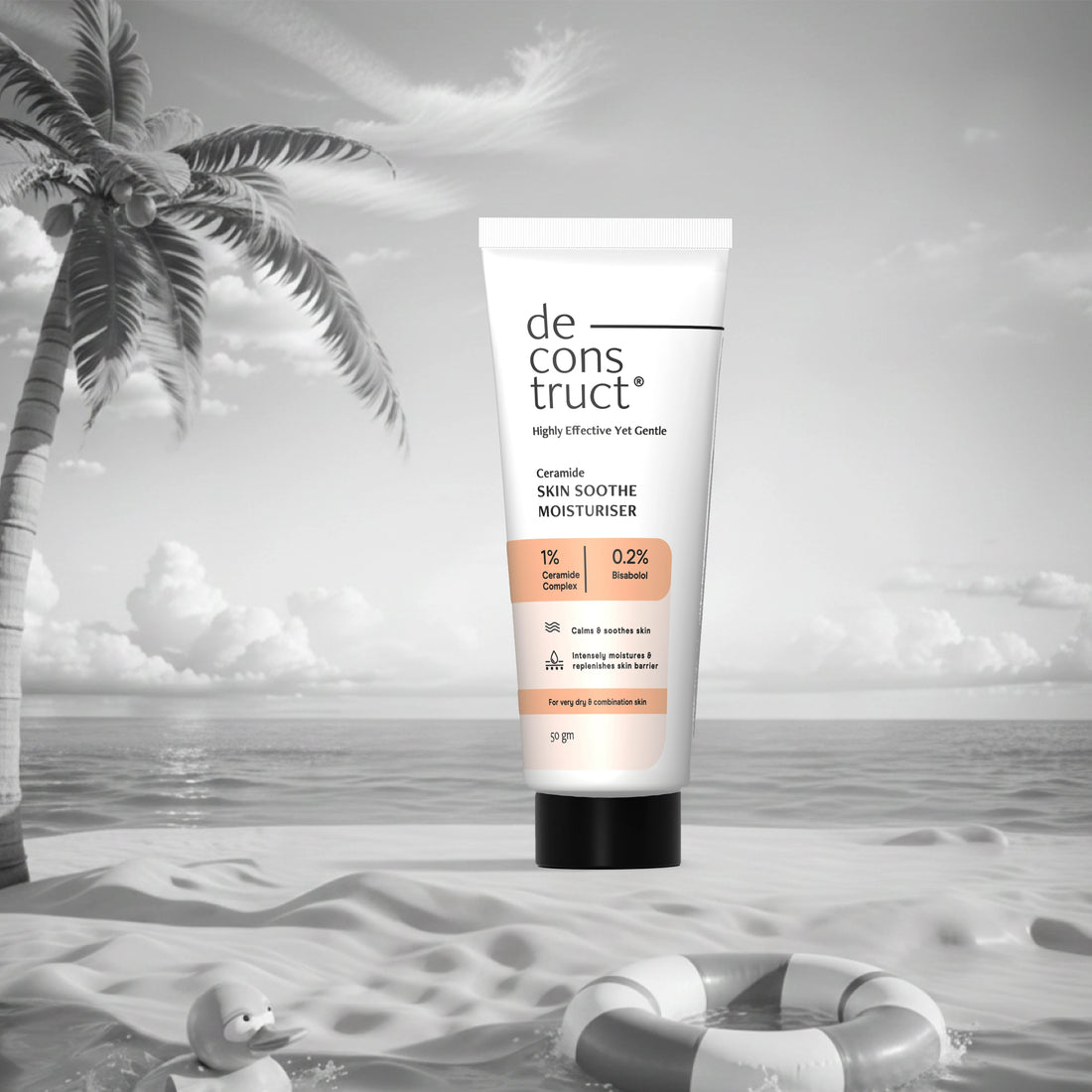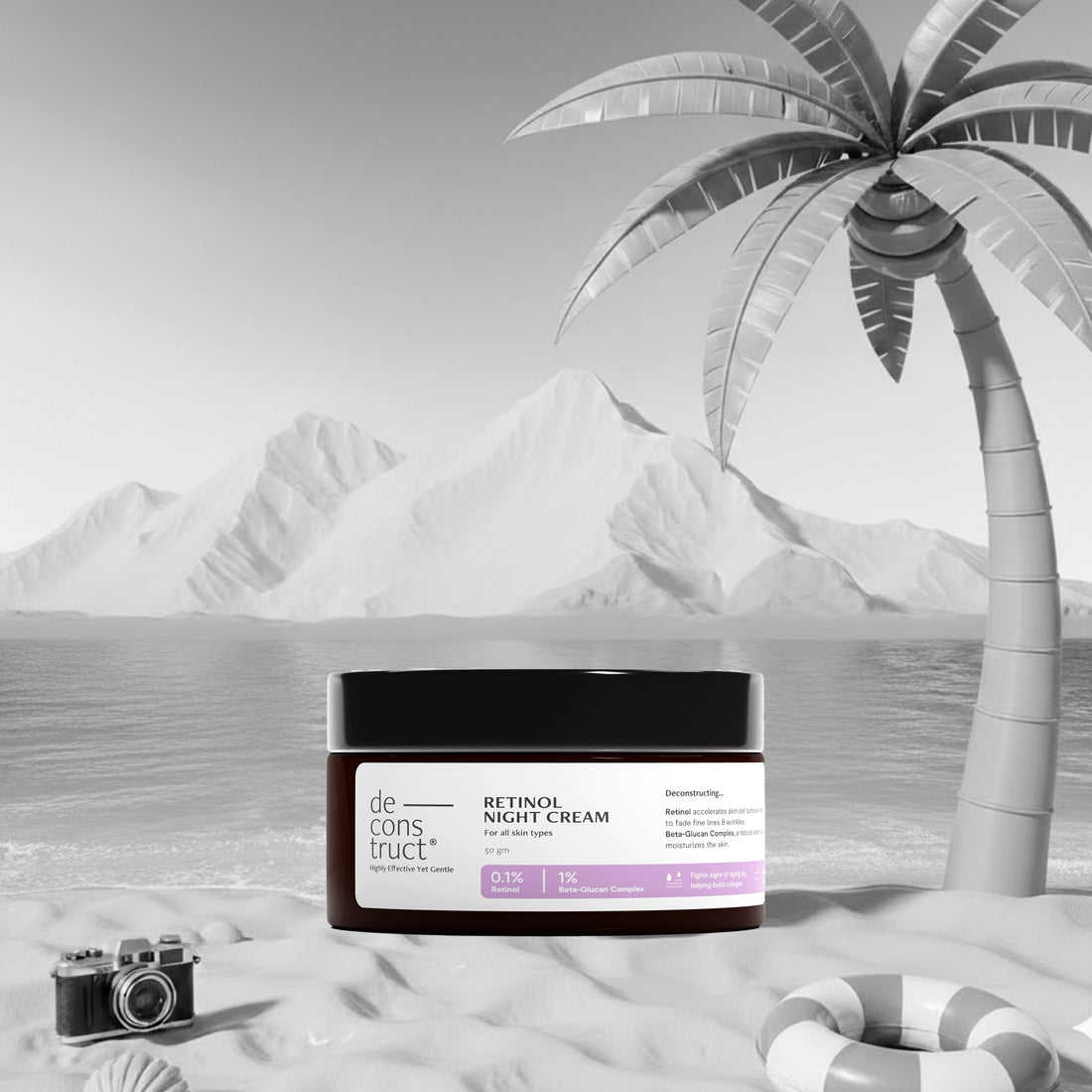When it comes to moisturizing, people with oily skin face a lot of challenges. From the right ingredients to the quantity of moisturizer to use, it's tough to get it right. Despite dermatologists' insistence on using moisturizer for oily skin, the urge to skip moisturizer is particularly high for those with oily skin.
The right moisturizer for oily skin type does not make your face greasy. It does not clog your pores and does not incite more acne on your face. It hydrates your face while feeling light on the skin. Over time, with consistent usage, it improves your skin’s texture and boosts radiance. But everything depends on the correct ingredients like Niacinamide, Hyaluronic Acid, and more. Using them in the correct order and quantities is also key. This dermatologically-approved guide explains why moisturizers for oily skin are game-changers and which ingredients are the most effective and more.
Why Moisturizing Oily Skin is Still Essential?
The "Oily skin does not need moisturizers" myth has been spreading for too long. But skipping moisturizer makes your oily-skin-related issues worse in reality.
Dehydration leads to more oil production. It overstimulates your sebaceous glands to release more oil, leading to blocked pores and worsened acne breakouts.
Additionally, without proper hydration, your skin barrier won’t be able to withstand environmental damage, leading to sensitivity, inflammation, pigmentation, and even acne issues.
Dermatologists point out that oil and hydration are not synonymous. Although oily skin contains a lot of sebum, it may still be dry. A non-comedogenic moisturizer will help to maintain a strong skin barrier without aggravating acne.
Focus on Oil-Free, Lightweight Formulas
A moisturizer's formulation, along with ingredient composition, is a game-changer for oily skin. Heavy and oil-based creams will leave an oily residue and block your pores. As an alternative, dermatologists recommend lightweight oil-free moisturizers that provide sufficient hydration to the skin without clogging your pores.
Use a gel-based or water-based moisturizers that absorb quickly and does not create a greasy texture. Additionally, non-comedogenic moisturizers hydrate without clogging pores.
A tip: Look for labels like “oil-free”, “non-comedogenic”, “will not clog pores”, etc, to filter products that work well.
The following ingredients are the holy grail of an effective skincare routine for the oily skin type. The right moisturizer for oily skin has at least one of the following actives :
-
Hyaluronic Acid: It's a light humectant that traps water in the skin. Provides deep hydration without being heavy on the skin.
-
Glycerin: Acts as a moisture-protective coating on the skin. Strengthens skin’s moisture barrier, thus preventing drying.
-
Niacinamide (Vitamin B3):Regulates the production of oil and enhances the skin texture. It also helps fight acne and inflammation.
-
Salicylic Acid: A BHA (Beta hydroxy acid) that gently exfoliates the skin, clears pores of dirt and impurities, and reduces breakouts.
Below’s a table to help you understand the function of each of these actives for oily skin.
|
Ingredients |
Benefits for oily skin |
|
Hyaluronic Acid |
Gives deep hydration without making skin greasy |
|
Glycerin |
Strengthens skin’s moisture barrier. Prevents dryness |
|
Niacinamide |
Balances oil production, reduces inflammation |
|
Salicylic Acid |
Gently exfoliates skin. Removes dirt and impurities collected in pores |
Knowing the right actives is one step, but using them correctly is equally important. Here’s a step-by-step routine on How to Use Niacinamide Moisturizer effectively in your skincare.
Dermatologist-Recommended Tips for Oily Skin Moisturizers
There is no one-size-fits-all solution when it comes to skin problems. However, a few tips for oily skin, such as using a non-comedogenic moisturizer, can go a long way. Below are helpful dermatologist-recommended tips for finding the best moisturizer for oily skin.
-
Pick a moisturizer with SPF: UV radiation worsens sebum production and acne scars. Hence, a moisturizer with SPF is the perfect solution for getting both hydration and sun protection in a single product.
-
Opt for alcohol-free and fragrance-free products: Alcohol and fragrance-induced skincare products dry up skin’s natural oils, cause dehydration, and lead to excess oil production. These products irritate acne-affected skin.
-
Choose mattifying products: Ingredients like Silica, Perlite, or Dimethicone absorb overproduction of sebum during the day so that the skin does not become greasy.
-
Experiment with textures: Try different formulations from gel-based to water-based to see how your skin handles each. The more you know your skin, the more accurate decisions you can make for it.
-
Target specific concerns: Moisturizers with Niacinamide or Salicylic Acid are highly effective for acne-prone skin.
You can explore our roundup of Best Niacinamide Moisturizers for Every Skin Type to find a formula suited to your needs.
Consider your skin’s specific needs
The ideal moisturizer for oily skin type checks your skin’s primary as well as secondary concerns. Ask yourself the following 4 questions before getting one.
-
Is it a non-comedogenic moisturizer, or will it clog your pores?
-
Does it specifically state that it is gel-based, water-based, or oil-free moisturizer?
-
Does it address your secondary skin concerns like acne, sensitivity, and sun protection?
-
Have you patch-tested it to make sure it doesn’t cause issues with your skin?
Final Thoughts: Choosing the Right Moisturizer for Oily Skin
Choosing the right moisturizer for oily skin doesn't have to be tricky. It's about knowing your skin, skin issues, and the right skincare actives. Finally, consistency is the key.
Oily skin causes greasiness and is prone to acne breakouts. So instead of ditching the moisturizer and deteriorating the skin in the long run, select an oil-free moisturizer with the right ingredients.
Gel and water formulas that are non-comedogenic and oil-free work best. Glycerin, Salicylic acid, Hyaluronic acid, and Niacinamide are the power ingredients that help fight acne and acne marks while keeping your skin hydrated. Your oily skin does not need to be a struggle.
With the correct selection of moisturizer, oily skin can be perfectly balanced, hydrated, and plump-looking. Consistently using the right moisturizer for 4-8 weeks is the key to improving your skin in the long run. If you want to understand what kind of changes to expect, read our guide on Niacinamide Moisturizer Results
FAQs
Which moisturizers do dermatologists recommend for oily skin?
Dermatologists recommend lightweight, oil-free moisturizers with ingredients like Hyaluronic acid, Niacinamide, or Glycerin.
How to pick a moisturizer for oily skin?
Check the label for non-comedogenic and oil-free moisturizer, choose a gel or water-based formula, and avoid heavy creams.
Can I skip moisturiser for 2 days?
Skipping moisturiser can cause dehydration, making your skin produce more oil. Even oily skin needs daily hydration.





